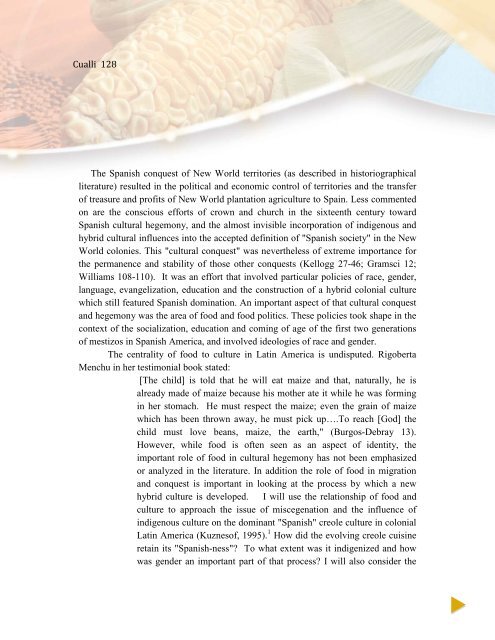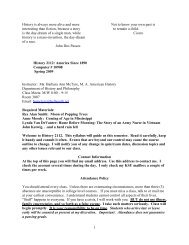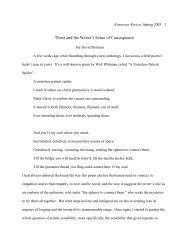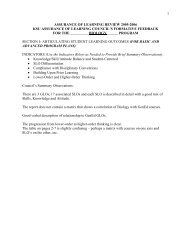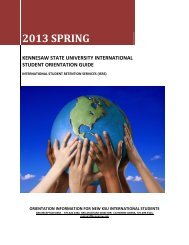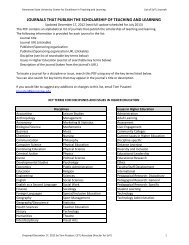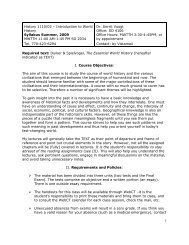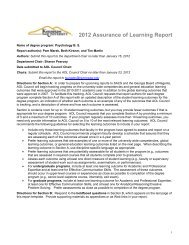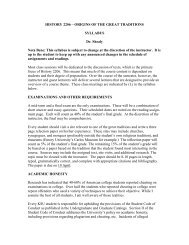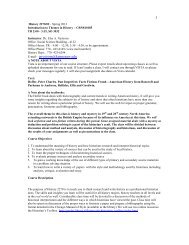Food, Gender and Cultural Hegemony - Kennesaw State University
Food, Gender and Cultural Hegemony - Kennesaw State University
Food, Gender and Cultural Hegemony - Kennesaw State University
You also want an ePaper? Increase the reach of your titles
YUMPU automatically turns print PDFs into web optimized ePapers that Google loves.
Cualli 128<br />
The Spanish conquest of New World territories (as described in historiographical<br />
literature) resulted in the political <strong>and</strong> economic control of territories <strong>and</strong> the transfer<br />
of treasure <strong>and</strong> profits of New World plantation agriculture to Spain. Less commented<br />
on are the conscious efforts of crown <strong>and</strong> church in the sixteenth century toward<br />
Spanish cultural hegemony, <strong>and</strong> the almost invisible incorporation of indigenous <strong>and</strong><br />
hybrid cultural influences into the accepted definition of "Spanish society" in the New<br />
World colonies. This "cultural conquest" was nevertheless of extreme importance for<br />
the permanence <strong>and</strong> stability of those other conquests (Kellogg 27-46; Gramsci 12;<br />
Williams 108-110). It was an effort that involved particular policies of race, gender,<br />
language, evangelization, education <strong>and</strong> the construction of a hybrid colonial culture<br />
which still featured Spanish domination. An important aspect of that cultural conquest<br />
<strong>and</strong> hegemony was the area of food <strong>and</strong> food politics. These policies took shape in the<br />
context of the socialization, education <strong>and</strong> coming of age of the first two generations<br />
of mestizos in Spanish America, <strong>and</strong> involved ideologies of race <strong>and</strong> gender.<br />
The centrality of food to culture in Latin America is undisputed. Rigoberta<br />
Menchu in her testimonial book stated:<br />
[The child] is told that he will eat maize <strong>and</strong> that, naturally, he is<br />
already made of maize because his mother ate it while he was forming<br />
in her stomach. He must respect the maize; even the grain of maize<br />
which has been thrown away, he must pick up….To reach [God] the<br />
child must love beans, maize, the earth," (Burgos-Debray 13).<br />
However, while food is often seen as an aspect of identity, the<br />
important role of food in cultural hegemony has not been emphasized<br />
or analyzed in the literature. In addition the role of food in migration<br />
<strong>and</strong> conquest is important in looking at the process by which a new<br />
hybrid culture is developed. I will use the relationship of food <strong>and</strong><br />
culture to approach the issue of miscegenation <strong>and</strong> the influence of<br />
indigenous culture on the dominant "Spanish" creole culture in colonial<br />
Latin America (Kuznesof, 1995). 1 How did the evolving creole cuisine<br />
retain its "Spanish-ness"? To what extent was it indigenized <strong>and</strong> how<br />
was gender an important part of that process? I will also consider the<br />
[Type text]


